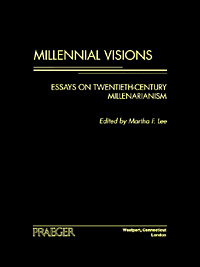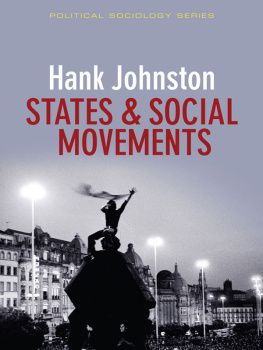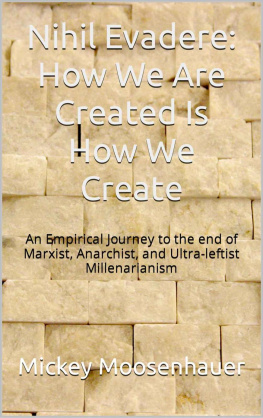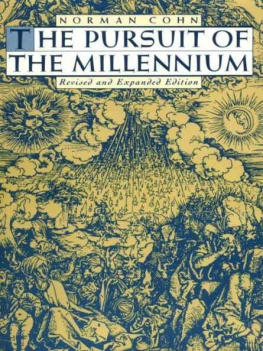Cover

| title | : | Millennial Visions: Essays On Twentieth-century Millenarianism |
| author | : | Lee, Martha F. |
| publisher | : |
| isbn10 | asin | : | 0275966909 |
| print isbn13 | : | 9780275966904 |
| ebook isbn13 | : | 9780313049361 |
| language | : |
| subject |
| publication date | : |
| lcc | : |
| ddc | : |
| subject | : |
Page i
MILLENNIAL VISIONS
Page ii
This page intentionally left blank.
Page iii
MILLENNIAL VISIONS
ESSAYS ON TWENTIETH-CENTURY MILLENARIANISM
Edited by Martha F.Lee

Page iv
Library of Congress Cataloging-in-Publication Data
Millennial visions: essays on twentieth-century millenarianism/edited by
Martha F.Lee.
p. cm.
Includes bibliographical references and index.
ISBN 0-275-96690-9 (alk. paper)
1. Millennialism. I. Lee, Martha F. (Martha Frances), 1962
BL503.2M552 2000
001.9dc21 99088489
British Library Cataloguing in Publication Data is available.
Copyright 2000 by Martha F.Lee
All rights reserved. No portion of this book may be
reproduced, by any process or technique, without the
express written consent of the publisher.
Library of Congress Catalog Card Number: 99088489
ISBN: 0-275-96690-9
First published in 2000
Praeger Publishers, 88 Post Road West, Westport, CT 06881
An imprint of Greenwood Publishing Group, Inc.
www.praeger.com
Printed in the United States of America

The paper used in this book complies with the
Permanent Paper Standard issued by the National
Information Standards Organization (Z39.481984).
10 9 8 7 6 5 4 3 2 1
Page v
Copyright Acknowledgments
The editor and publisher gratefully acknowledge permission to use excerpts:
From Dreams of Millennium by Mark Kingwell. Copyright 1996 by Mark Kingwell. Reprinted by permission of Penguin Books Canada Limited.
From The Feminine Mystique by Betty Friedan. Copyright 1983, 1974, 1973, 1963 by Betty Friedan. Reprinted by permission of W.W. Norton & Company, Inc.
From The Second Stage by Betty Friedan. Copyright 1981. First appeared in The Second Stage. Published by Simon & Schuster, Inc. Reprinted by permission of Curtis Brown, Ltd.
Page vi
For Ruairidh Alexander,
who will live most of his life in the third millennium.
Page vii
Contents
Preface
Martha F.Lee | ix |
I.
Understanding the Millennial Urge | |
| Modernity and the Millennium: From Robespierre to Radical Feminism
Thomas Flanagan | |
| (Stop) Making Sense of the Millennium: Politics and Culture at the End
Mark Kingwell | |
| Millennium Culture: The Year 2000 as a Religious Event
Michael Barkun | |
| Apocalypse and Community: Rethinking the Origins of Millennialism
Martha F.Lee | |
II.
Millennial Ideologies | |
| The Fate That Hate Produced: Religion, Science, and Fiction in New Millennial Racialism
Frederick Wall | |
Page viii
| Impulse to Growth: The Feminist Millennium of Betty Friedan
Thomas Heilke | |
| UFOs, Extraterrestrials, and the Apocalypsethe Making of a Subculture
Philip Lamy | |
| When Your Friend Is Your Enemy: American Christian Fundamentalists and Israel at the New Millennium
Brenda E.Brasher | |
| Augusto Csar Sandino: Prophet of the Segovias
Marco A.Navarro-Gnie | |
| Sectes and Sovereignty: Quebecs Apocalyptic Movements in Political Context
Susan J.Palmer | |
| Social Science and the Third Age: Joachim of Fiore, G.E. Lessing, and Auguste Comte
Thomas Flanagan | |
Index | |
About the Contributors | |
Page ix
Preface
Martha F.Lee
In the first months of the twenty-first century it is difficult to find anyone who does not have at least a passing knowledge of the terms millennium and millenarianism. What was once a marginal field of study has now entered the mainstream. It has moved from the exclusive domain of small coteries of specialists to become a major category of social analysis (Barkun 1996:1), and from the realm of scholarship to become part of popular culture and public discourse. A clear reason for this is the year 2000. Its symbolic power, combined with the rapid pace of technological development and globalization, has given us the sense that we are somehow living at a most unusual and important moment in history. In addition to this, it has focused increased attention on millenarian movements. Groups who anticipate the imminent end of history seem to have proliferated since the 1980s, and with that growth, their perceived potential for violence has also increased.
It was in the context of these developments that the Humanities Research Group at the University of Windsor chose as its theme for the 199798 academic year The Millennium Approaches, and it is from its Distinguished Speakers Series that the first four papers and the final essay in this volume are drawn. The Humanities Research Group was founded in 1989, in order to promote research in all areas of the humanities and to facilitate the exchange of ideas across disciplines. In consideration of this mandate, millennialism was also a fitting topic for the Research Group. The late twentieth century millennial urge touches on all areas of our cultural, political and social lives, and it has been studied by scholars from a variety of academic disciplines, including philosophy, political science, history, religious studies, sociology, and anthropol
Page x
ogy. The essays in this volume reflect the nature of humanities research: they present a holistic picture of millenarianism, and they do so from a variety of disciplinary perspectives. As noted, the first four chapters of this book are based on public lectures, both formal and informal, and focus on more theoretical aspects of millenarianism, especially as it relates to the year 2000. The seven chapters that follow are specific studies that illustrate many of the themes highlighted in the theoretical chapters. These later chapters focus on specific millenarian movements or ideologies (both religious and political), each of which is a product of, or took root in, the Americas. Although millenarian ideologies can be found in virtually every region of the globe, such a geographical focus allows for the identification of common themes and tendencies.
Next page








